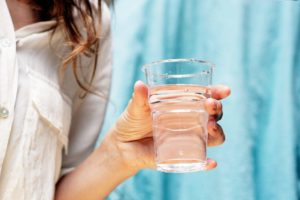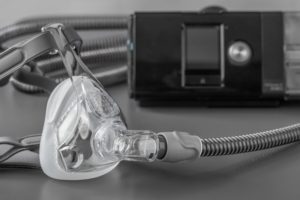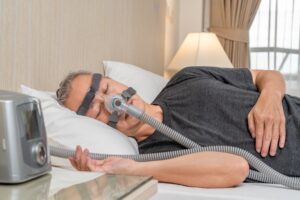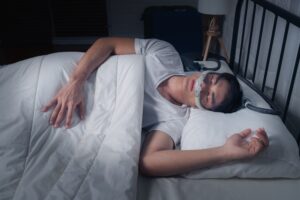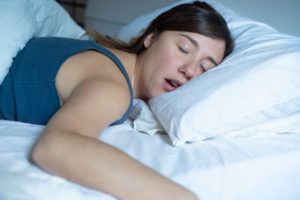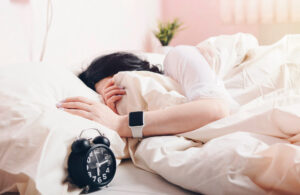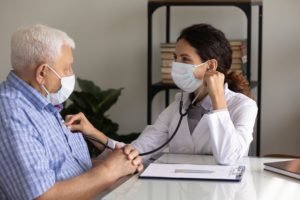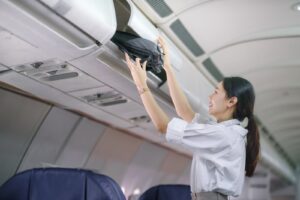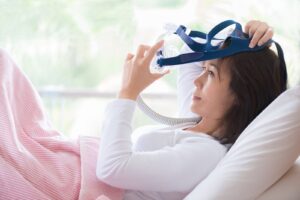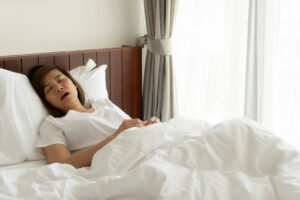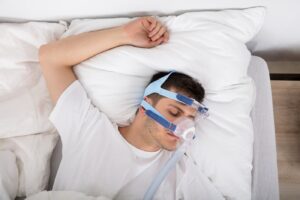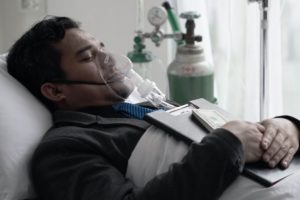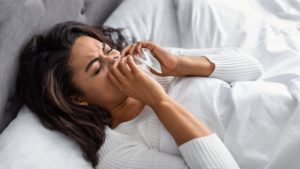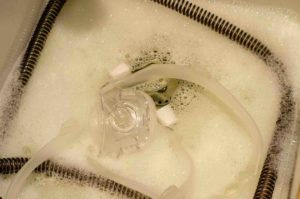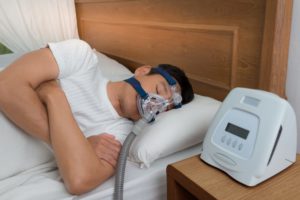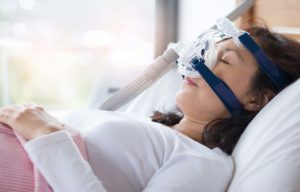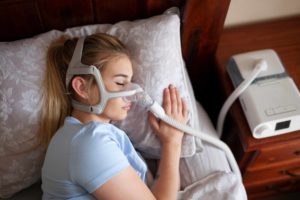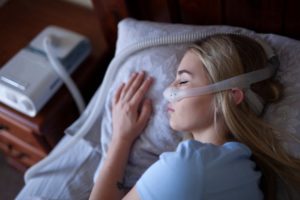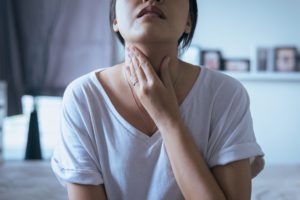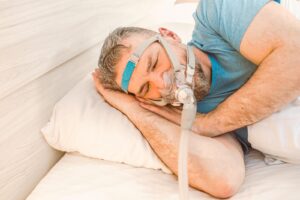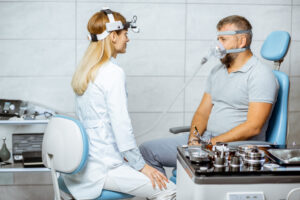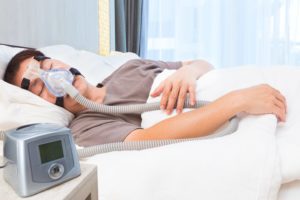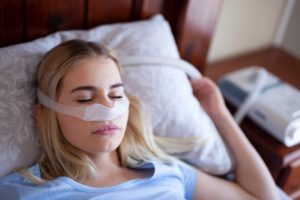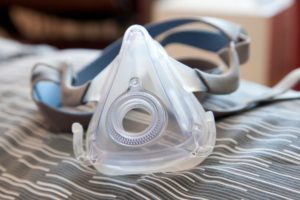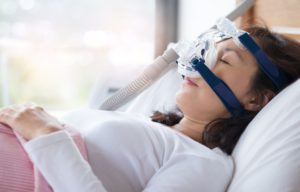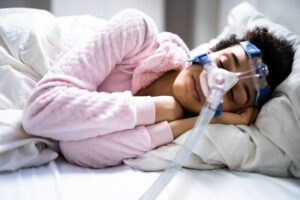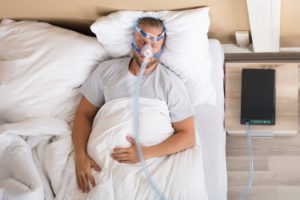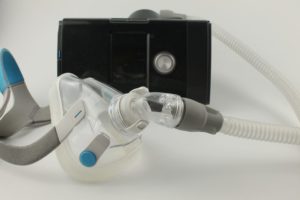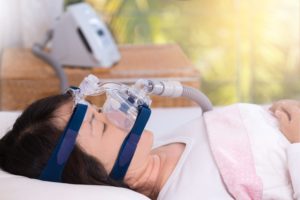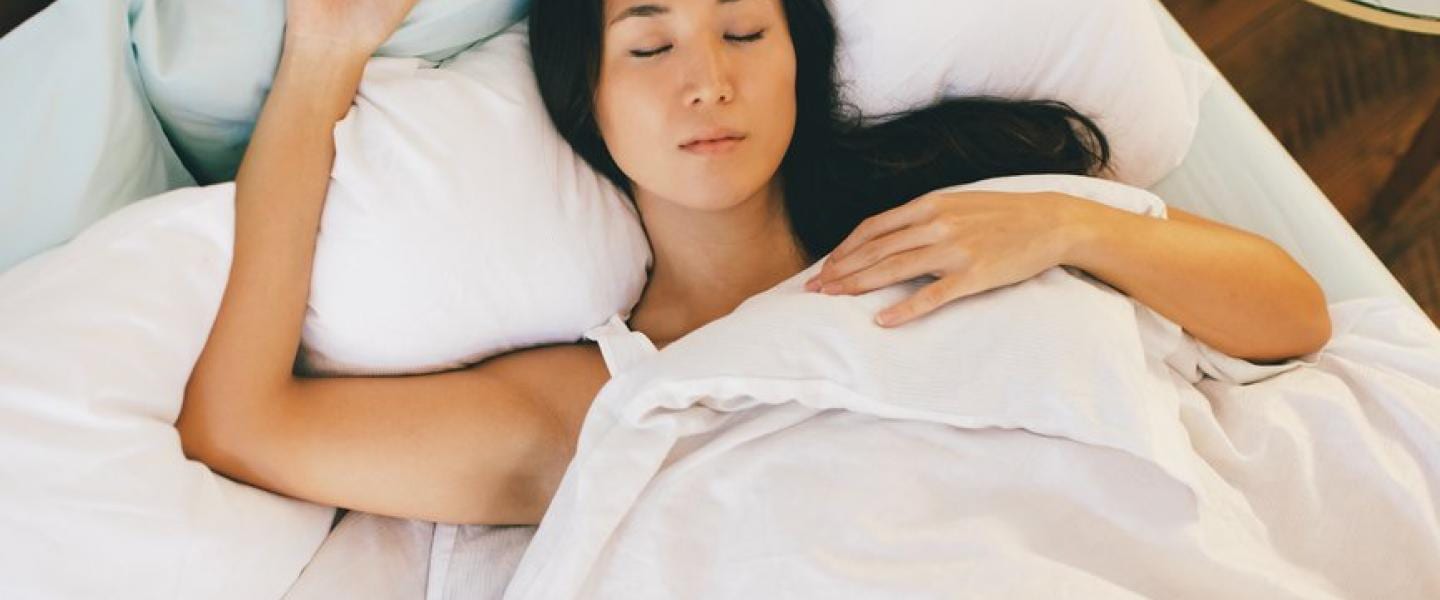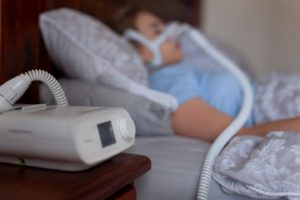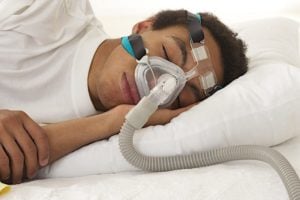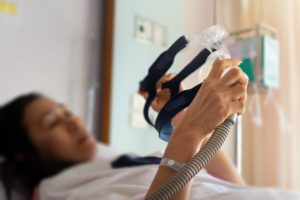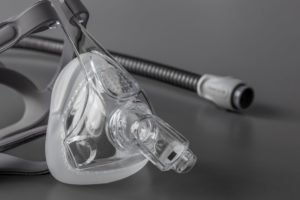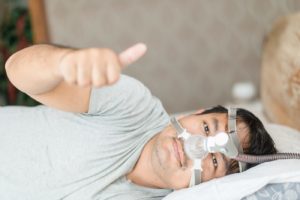When you buy through our links, we may earn a commission. Products or services may be offered by an affiliated entity. Learn more.
CPAP Dry Mouth
- Dry mouth is a common side effect of CPAP therapy, resulting from mouth breathing, decreased saliva production, and mask leaks.
- Adding a heated humidifier or heated tubing, ensuring a proper mask fit (or switching mask types), and using a chin strap can significantly reduce dry mouth.
- If dry mouth persists despite adjustments, talk to your doctor or sleep specialist, because ongoing dryness can interfere with consistent CPAP use.
Dry mouth is one of the most common side effects people experience when using CPAP therapy. Many people wake up to a sticky or parched feeling because the airflow from the machine can dry out the mouth, especially if the mask leaks or you breathe through your mouth at night. The good news is that several simple adjustments can make CPAP therapy much more comfortable.

Exploring CPAP But Not Sure Where to Start?
Our at-home sleep study is convenient, stress-free, and accurate. Get results within a few days.
How CPAP Machines Can Cause Dry Mouth
CPAP users may experience dry mouth for a few different reasons.
- Mouth breathing: Some people using CPAP may exhale through the mouth rather than the nose. Exhaling through the mouth during sleep can dry it out.
- Poorly fitting mask: A CPAP mask that’s too loose or too tight can contribute to dry mouth, as well as reduce the treatment’s effectiveness.
- Decreased flow of saliva: Research suggests that the high pressure in the mouth created by CPAP can block the flow of saliva, which normally keeps the mouth moist.
Other Causes of Dry Mouth
Using a CPAP machine isn’t the only cause of dry mouth while sleeping. Obstructive sleep apnea itself, even when a person isn’t using CPAP, can increase the risk of dry mouth. Several other factors may also contribute to this symptom.
- Medications: Dry mouth is a common side effect of antihistamines, decongestants, and many other medications.
- Dehydration:Dehydration occurs when there isn’t enough fluid in the body. It may be caused by not taking in enough fluid or by losing fluid through diarrhea, vomiting, or excessive urination or sweating.
- Advanced age: The sense of thirst can diminish as people age, which may lead them to drink less and become dehydrated.
- Salivary gland problems: Salivary glands produce the saliva that moistens the mouth. The salivary glands’ normal function can be disrupted by infections, cancer treatment, and diseases such as Sjögren’s syndrome.
- Additional possible causes: Diabetes, anxiety, HIV infection, and the use of tobacco, marijuana , and methamphetamine can all contribute to mouth dryness.
How to Prevent Dry Mouth With CPAP
CPAP users can take a number of steps to alleviate dry mouth. The best solution depends on the main cause of the problem.
Use a CPAP Humidifier
One step that may reduce dry mouth is moistening the airflow through the CPAP by using a humidifier. Humidification can also help if the nose gets dried out , which often accompanies dry mouth.
Different methods may be used for humidification. The choice of method can depend on personal preference and the type of CPAP machine.
- Inline heat moisture exchange humidifiers: These devices warm the air circulating from the CPAP machine and add moisture to it.
- Built-in humidifiers: Many CPAP machines include built-in humidifiers with adjustable temperature settings.
- Cold passover humidifiers: This style of humidifier moistens air as it passes over room temperature water without heating it.
- Heated tubing: Some CPAP machines use heated tubing to increase the moisture level and temperature of the pumped air, which may help with dry mouth.
- Room humidifiers: If dry air in the environment is contributing to dry mouth, a standalone humidifier can help moisten the air in the bedroom and provide relief.
Keep Your Mouth Closed
A frequent cause of dry mouth for CPAP users is mouth breathing, in which the mouth is open during sleep. Keeping the mouth closed with a chin strap or adhesive strips can reduce mouth breathing and relieve dry mouth.
- Chin strap:Chin straps encircle the head and gently cradle the chin to keep it closed. Research shows that chin straps increase people’s willingness to continue using CPAP.
- Mouth tape: CPAP users may also use mouth tape, a disposable adhesive strips applied over the mouth, to encourage sleeping with the mouth closed.
Relieve Nasal Congestion
Nasal congestion can lead to mouth breathing, especially in children with obstructive sleep apnea.Relieving nasal congestion with saltwater nasal sprays or medication may help control mouth breathing.
Find the Right CPAP Mask
A CPAP mask that fits poorly or seals improperly can cause air leaks and dry mouth. Selecting a face mask is part of the initial set-up when people begin using CPAP. But it’s common for people to switch to another mask if problems arise once they start using CPAP at home. A doctor or sleep specialist can provide guidance on the most appropriate options.
Many styles and sizes of CPAP masks are available, and some can address specific concerns. For example, a mask that covers both the nose and mouth may improve mouth dryness, particularly if chin straps aren’t effective.
Tips for Avoiding Other CPAP Side Effects
While CPAP therapy is highly effective for treating obstructive sleep apnea, some users experience side effects beyond dry mouth. Taking a few proactive steps can help improve comfort and make it easier to stay consistent with treatment.
Here are some other common CPAP side effects and how to address them:
- Skin irritation or pressure sores: Loosen straps slightly, switch to a softer or better-fitting mask, or use mask liners.
- Mask leaks: Refit or replace mask cushions, adjust headgear, or switch to a different mask style.
- Claustrophobia or discomfort: Use the ramp feature, try short acclimation sessions while awake, or discuss pressure adjustments with your provider.
- Aerophagia (air swallowing): Lower pressure settings (with provider guidance), switch to auto-adjusting CPAP, or sleep in a slightly elevated position.
- Dry or irritated eyes: Check for leaks blowing air upward and adjust or replace the mask if needed.
- Noise concerns: Ensure all connections are tight, replace filters, or move the machine farther from the bed.
As CPAP technology improves, new devices and approaches to making CPAP more comfortable may become available. If you have a problem with your CPAP, mention it to your health care provider. There may be a new product that can benefit you.
When to Talk to Your Doctor
It’s important to reach out to your doctor or sleep specialist if CPAP discomfort persists despite making adjustments at home. Ongoing dry mouth, frequent mask leaks, morning headaches, or difficulty tolerating the air pressure may signal that your pressure settings, mask type, or humidification levels need to be changed. But you should not attempt to make these changes on your own without first consulting your doctor.
You should also seek medical guidance if CPAP side effects make it difficult to use your machine consistently, as inconsistent therapy can reduce the effectiveness of treatment for obstructive sleep apnea.
If you experience new or worsening symptoms, such as severe nasal congestion, persistent sinus issues, chest discomfort, or noticeable changes in your breathing during sleep, your provider can help determine the cause and recommend a solution.

Still have questions? Ask our community!
Join our Sleep Care Community — a trusted hub of product specialists, sleep health professionals, and people just like you. Whether you’re searching for the perfect mattress or need expert sleep advice, we’ve got you covered. Get personalized guidance from the experts who know sleep best.
References
12 Sources
-
Brown, L. K. & Lee, W. (2021, September 17). Titration of positive airway pressure therapy for adults with obstructive sleep apnea. In N. Collop (Ed.). UpToDate.
https://www.uptodate.com/contents/titration-of-positive-airway-pressure-therapy-for-adults-with-obstructive-sleep-apnea -
Rowland, S., Aiyappan, V., Hennessy, C., Catcheside, P., Chai-Coezter, C. L., McEvoy, R. D., & Antic, N. A. (2018). Comparing the efficacy, mask leak, patient adherence, and patient preference of three different CPAP interfaces to treat moderate-severe obstructive sleep apnea. Journal of Clinical Sleep Medicine, 14(1), 101–108.
https://pubmed.ncbi.nlm.nih.gov/29198305/ -
Bortolotti, M. (2017). The cause of dry mouth during CPAP application. Journal of Clinical Sleep Medicine, 13(4), 647.
https://pubmed.ncbi.nlm.nih.gov/28162149/ -
Chang, V. T. (2022, February 28). Approach to symptom assessment in palliative care. In T. J. Smith (Ed.). UpToDate.
https://www.uptodate.com/contents/approach-to-symptom-assessment-in-palliative-care -
Hennessy, B. J. (2022, February). Dry mouth (Xerostomia). Merck Manual Consumer Version.
https://www.merckmanuals.com/home/mouth-and-dental-disorders/symptoms-of-oral-and-dental-disorders/dry-mouth -
Wang S. W. (2022, April 21). Cannabis (marijuana): Acute intoxication. In M. M. Burns & S. J. Traub (Eds.). UpToDate.
https://www.uptodate.com/contents/cannabis-marijuana-acute-intoxication -
Rinaldi, V., Costantino, A., Luchena, A., & Casale, M. (2022, March 2). Sleep-disordered breathing and CPAP treatment and management. Medscape.
https://emedicine.medscape.com/article/870192-treatment#showall -
Ghadiri, M., & Grunstein, R. R. (2020). Clinical side effects of continuous positive airway pressure in patients with obstructive sleep apnoea. Respirology, 25(6), 593–602.
https://pubmed.ncbi.nlm.nih.gov/32212210/ -
Knowles, S. R., O’Brien, D. T., Zhang, S., Devara, A., & Rowley, J. A. (2014). Effect of addition of chin strap on PAP compliance, nightly duration of use, and other factors. Journal of Clinical Sleep Medicine, 10(4), 377–383.
https://pubmed.ncbi.nlm.nih.gov/24733982/ -
Halbower, A. C. (2020, November 4). Continuous positive airway pressure (CPAP) for pediatric obstructive sleep apnea. In: R. D. Chervin (Ed.). UpToDate.
https://www.uptodate.com/contents/continuous-positive-airway-pressure-cpap-for-pediatric-obstructive-sleep-apnea -
Genta, P. R., Kaminska, M., Edwards, B. A., Ebben, M. R., Krieger, A. C., Tamisier, R., Ye, L., Weaver, T. E., Vanderveken, O. M., Lorenzi-Filho, G., DeYoung, P., Hevener, W., & Strollo, P. (2020). The importance of mask selection on continuous positive airway pressure outcomes for obstructive sleep apnea. An official American Thoracic Society workshop report. Annals of the American Thoracic Society, 17(10), 1177–1185.
https://pubmed.ncbi.nlm.nih.gov/33000960/ -
Strohl, K. P. (2021, July 8). Patient education: Sleep apnea in adults (Beyond the basics). In N. Collop (Ed.). UpToDate.
https://www.uptodate.com/contents/sleep-apnea-in-adults-beyond-the-basics



